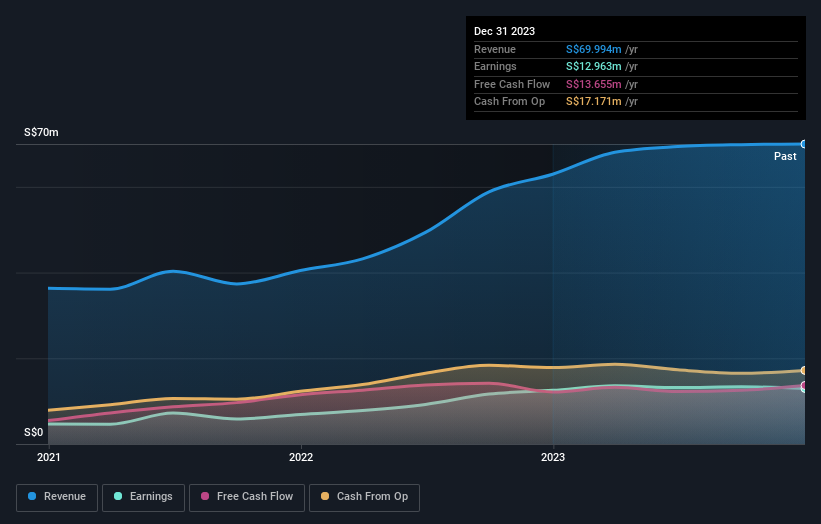ISEC Healthcare Ltd.'s (Catalist:40T) top owners are public companies with 57% stake, while 23% is held by individual investors
Key Insights
Significant control over ISEC Healthcare by public companies implies that the general public has more power to influence management and governance-related decisions
Aier Eye Hospital Group Co., Ltd. owns 57% of the company
Every investor in ISEC Healthcare Ltd. (Catalist:40T) should be aware of the most powerful shareholder groups. And the group that holds the biggest piece of the pie are public companies with 57% ownership. In other words, the group stands to gain the most (or lose the most) from their investment into the company.
Meanwhile, individual investors make up 23% of the company’s shareholders.
Let's delve deeper into each type of owner of ISEC Healthcare, beginning with the chart below.
View our latest analysis for ISEC Healthcare
What Does The Lack Of Institutional Ownership Tell Us About ISEC Healthcare?
Institutional investors often avoid companies that are too small, too illiquid or too risky for their tastes. But it's unusual to see larger companies without any institutional investors.
There are multiple explanations for why institutions don't own a stock. The most common is that the company is too small relative to funds under management, so the institution does not bother to look closely at the company. It is also possible that fund managers don't own the stock because they aren't convinced it will perform well. ISEC Healthcare might not have the sort of past performance institutions are looking for, or perhaps they simply have not studied the business closely.
We note that hedge funds don't have a meaningful investment in ISEC Healthcare. Our data shows that Aier Eye Hospital Group Co., Ltd. is the largest shareholder with 57% of shares outstanding. With such a huge stake in the ownership, we infer that they have significant control of the future of the company. Meanwhile, the second and third largest shareholders, hold 4.8% and 3.5%, of the shares outstanding, respectively. Two of the top three shareholders happen to be Chief Executive Officer and Vice Chairman, respectively. That is, insiders feature higher up in the heirarchy of the company's top shareholders.
While it makes sense to study institutional ownership data for a company, it also makes sense to study analyst sentiments to know which way the wind is blowing. As far as we can tell there isn't analyst coverage of the company, so it is probably flying under the radar.
Insider Ownership Of ISEC Healthcare
While the precise definition of an insider can be subjective, almost everyone considers board members to be insiders. The company management answer to the board and the latter should represent the interests of shareholders. Notably, sometimes top-level managers are on the board themselves.
I generally consider insider ownership to be a good thing. However, on some occasions it makes it more difficult for other shareholders to hold the board accountable for decisions.
It seems insiders own a significant proportion of ISEC Healthcare Ltd.. Insiders own S$47m worth of shares in the S$238m company. This may suggest that the founders still own a lot of shares. You can click here to see if they have been buying or selling.
General Public Ownership
The general public-- including retail investors -- own 23% stake in the company, and hence can't easily be ignored. This size of ownership, while considerable, may not be enough to change company policy if the decision is not in sync with other large shareholders.
Public Company Ownership
It appears to us that public companies own 57% of ISEC Healthcare. It's hard to say for sure but this suggests they have entwined business interests. This might be a strategic stake, so it's worth watching this space for changes in ownership.
Next Steps:
While it is well worth considering the different groups that own a company, there are other factors that are even more important. For instance, we've identified 1 warning sign for ISEC Healthcare that you should be aware of.
If you would prefer check out another company -- one with potentially superior financials -- then do not miss this free list of interesting companies, backed by strong financial data.
NB: Figures in this article are calculated using data from the last twelve months, which refer to the 12-month period ending on the last date of the month the financial statement is dated. This may not be consistent with full year annual report figures.
Have feedback on this article? Concerned about the content? Get in touch with us directly. Alternatively, email editorial-team (at) simplywallst.com.
This article by Simply Wall St is general in nature. We provide commentary based on historical data and analyst forecasts only using an unbiased methodology and our articles are not intended to be financial advice. It does not constitute a recommendation to buy or sell any stock, and does not take account of your objectives, or your financial situation. We aim to bring you long-term focused analysis driven by fundamental data. Note that our analysis may not factor in the latest price-sensitive company announcements or qualitative material. Simply Wall St has no position in any stocks mentioned.

 Yahoo Finance
Yahoo Finance 

